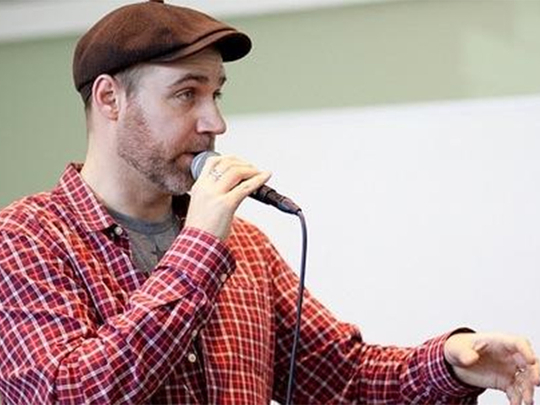
Dubai: Benji Rogers calls himself a recovering musician. He grew up in the music business and even created his own record label at an early age.
But Rogers’ focus these days is not music, but finding a way to introduce BlockChain, the technology behind BitCoin, into the music industry.
Rogers first got the idea of using BlockChain after hearing from a producer of a virtual reality game that the only reason a song was not used in the game was because the company didn’t know who to contact.
“If you want to put visuals and audio together, you have to get permission from the person who wrote the song. They may be dead … so why don’t you put the information about who wrote the song into the media file itself along with the performance information,” he said. “And if they are both bound into the media, whereever that media goes, you have a persistent change log of information that only a BlockChain can handle.”
Meet Benji Rogers, the guy who wants to bring #blockchain to the music world #GITEX2017 pic.twitter.com/pjE3CiItUk
— Scott Shuey (@ScottShuey) October 10, 2017
So in 2009, Rogers launched PledgeMusic, an online music platform that allows musicians to sell directly to their fan base. While working for the company, Rogers started to look at BlockChain.
The technology would make it easier for artists to license, sell and distribute their music across multiple platforms. Rogers’ new company, Dot BlockChain, of which he is also the CEO, uses a slightly different form of BlockChain than is used by BitCoin, called DotBC.
Under this version of BlockChain, every song will have a file with a. bc extension that includes a registry of information about the song, including everything from who played on the song, to who owns the copyright, to who owns a license to use the music. DotBC will use Intel’s Sawtooth platform, which uses an open-source form of BlockChain.
“The DotBC is the wrapper that shows you where it lives and who has permission to do what with it,” Rogers said.
DotBC will start operating in October and with apps becoming publicly available in the first quarter of 2018. User will be able to send requests to the song directly to change the data in the BlockChain registry, including the right to use the song for commercial purposes. How many songs could eventually be included? There are currently 63 million songs available on the market, with tens of thousands of new songs being added daily, Rogers said.
“What we are doing is allowing people to authoritatively crowdsource and corroborate information into a central place that lives in a decentralised world,” he said. It is also “always tracking who owns what and how to contact and pay them.”
Rogers declined to name the artists that have signed up for his BlockChain project, but he is currently working with the Society of Composers, Authors and Music Publishers of Canada (SOCAN) and Songtrust, a global digital rights management platform.
Rogers’ interest in combining tech with music comes from his days promoting his band on MySpace, the dominate social media space before Facebook.
Using social media, Rogers built us a following of approximately 150,000 follower, with whom he could communicate directly.
The problem was that when MySpace began to decline, Rogers had no way of reaching his fans directly. MySpace had the email addresses, not him.
“One of the things I saw was if I had the mail address of my fans, I had the power,” he said. “When I gave the information of my fans to MySpace, MySpace had the power. When MySpace died, I lost 150,000 fans. No way to contact them. No way to be in touch with them.”
Rogers said the company will next look into how to apply BlockChain to movies, television and even journalism stories, which can all be packaged with data and then monetized.







